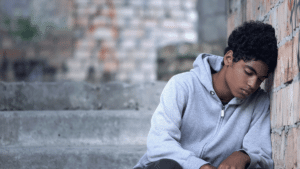A traumatic event is any event that leaves long-lasting emotional distress that does not go away without support from a trained behavioral therapist. Childhood trauma and addiction often coincide as teens don’t know how to process their feelings and will turn to drugs and alcohol for relief. If they don’t get help from a trauma therapy program, their condition will worsen and potentially lead to a worsening addiction, suicidal thoughts, or other self-destructive behavior.
At Imagine Seattle, we offer compassionate support for teens 12-17 who are struggling with a co-occurring disorder of substance abuse and trauma. We offer outpatient treatment programs where teens can talk about the trauma in a safe and encouraging space with therapists and their peers. They learn how to change negative thoughts and behaviors and develop coping skills that will help them today and in the future. For more information about our trauma therapy program, call 888.346.0473 or fill out our online form today, and we will get back to you as soon as possible.
Can Trauma Cause Co-Occurring Disorders?
Teens who experience an accident, natural disaster, or abuse rarely have the coping skills necessary to process the feelings caused by trauma. They are more likely to shut down and avoid talking about the event because they don’t know how to express what they are feeling. If their parents drink or use drugs, teens will subconsciously crave it because they see how it makes them feel better.
Peer pressure can also lead teens to try drugs and alcohol after a traumatic event. They only want to see their friends feel better and will offer drugs or alcohol to help them in the only way they know how. If you suspect your teen son or daughter is using drugs or alcohol because of a past or recent trauma, here are some of the signs of co-occurring disorders:
- Finding empty bottles or drug paraphernalia around the home
- Withdrawing from friends and family
- Erratic mood swings
- No longer participate in activities they used to enjoy
- Poor school performance
- Worsening depression or anxiety
At Imagine Seattle, we support teens who are struggling with addiction due to trauma. We work closely with each patient and their families to help them address the trauma and learn how to process their feelings in a healthy way.
Understanding the Relationship Between Childhood Trauma and Addiction
Trauma at an early age can impact the way the brain develops. While genetics do play a significant role, so does the environment they grow up in. Just like positive experiences are beneficial to developing healthy habits and traits, negative experiences can cause abnormalities in certain parts of the brain. A traumatic experience can cause a buildup of cortisol, a stress hormone that can impact the brain’s development and lead to:
- Failing grades
- Inability to cope with everyday stressful situations
- Unhealthy relationship traits
- Poor social skills
- Depression
- Anxiety
- Suicide
Co-occurring disorders of childhood trauma and addiction are treatable through a combination of behavioral therapy, family therapy, and medication to minimize withdrawal symptoms and cravings. Therapists work closely with each teen to understand the trauma that is affecting them and develop healthy coping and communication skills to process their feelings without the need for more drugs or alcohol.
Imagine Seattle Offers Safe and Effective Trauma Therapy Program for Your Teen
At Imagine Seattle, we provide compassionate support for teens who are struggling with trauma and the co-occurring disorder of addiction. Our team has experience working with childhood trauma and addiction and will take the time to build trust and a rapport with each patient to create an atmosphere of open and honest communication.
If you suspect your teen son or daughter is using drugs or alcohol to cope with a traumatic experience, call 888.346.0473 today to speak with our compassionate staff about how we can help your teen live a healthy and sober life.




